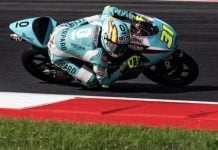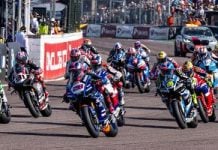LRRS officials have banned “rocket fuel” oxygenated race gas effective immediately, mandating that all four-stroke racebikes at LRRS events at New Hampshire International Speedway run either Sunoco fuel as sold at the racetrack or street pump gas from a yet-to-be-specified local gas station. Details of how the new rules will be enforced have yet to be released. LRRS officials cited concerns over health issues as well as the high cost of exotic race fuels in making the decision. Oxygenated race fuels typically cost between $18 and $25 a gallon and increase horsepower by 3-4 in a 600cc racebike and by 7-9 in a 1000cc racebike. The most exotic custom race fuels seen recently in AMA Pro competition sell for around $500 a gallon and produce even more horsepower. During the AMA Pro season finale at Mid-Ohio last September, several mechanics became physically ill after handling exotic custom race fuels. More information will be posted as it becomes available. Moto-ST is the only National series currently running a spec fuel, requiring use of a Sunoco unleaded fuel that sells for about $6 per gallon. This just in, from LRRS’ Jerry Wood: FIRST PERSON/OPINION Via e-mail: I got my first job as a race official in 1974 and if there is anything that I have learned over the last 33 years it is that none of us know it all. We must continue to gather information so that we can make intelligent decisions to make racing better and fair. I first took notice of the rocket fuel situation quite a few years ago when helping my son, Eric, fuel his bike at Daytona. The fumes made me a bit dizzy and sort of queasy, After reading the warnings on the label, I questioned why we needed this stuff in club racing. I must confess to not understanding at the time that these fuels could actually make power. I came from the school where we learned that you needed higher octane to avoid detonation and it did not directly make power. Now we are in the situation where if one top rider uses this fuel, than the other people who expect to compete must use it. It was a real shock to find out that some of the pros are spending $500 per gallon and the car guys up to $1,000. This has to stop. I set out to gather information to find out how to eliminate this expensive, hazardous fuel and was told that testing was very difficult and a rule would be very hard to enforce, so it has been an escalating status quo for a long time. Eric and I both did some investigating and found that we could lower costs for our racers and reduce the health hazard. When we asked other top expert riders, they all agreed that they would like to lower the costs of racing and living a longer, healthier life would be a bonus. Loudon is a tight little track with a lot of bikes running on it and our corner workers have reported feeling the effects of the fumes. We felt that it was important to move forward with this plan and needed to let our riders know at our awards banquet last weekend. We went forward and made the announcement to give as much notice as possible. I am not a big fan of spec race supplies. I like open competition, but in this case it seems like the best enforceable way to solve the problem. Jerry Wood Crystal River, Florida
Updated: LRRS Bans “Rocket Fuel” Race Gas
Updated: LRRS Bans “Rocket Fuel” Race Gas
© 2007, Roadracing World Publishing, Inc.






